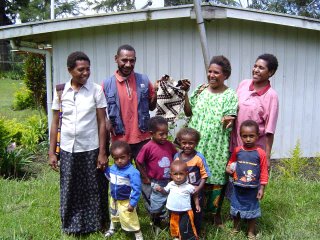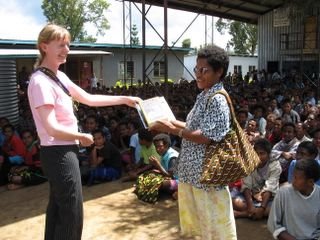 Last week I went to a local school’s 50th anniversary. It was a big celebration: one of the original founders (an Australian nun, who was 82) had come over for a week of festivities, culminating in this one day. A girl from Rabaul that I know had been teaching a group of female students some Tolai dances. This girl asked me if I would be willing to present the school founder with a few gifts, as they performed the dances. That was fine with me. Next she told me that she would provide me with my outfit: a meri blaus and a lap lap. This was also good.
Last week I went to a local school’s 50th anniversary. It was a big celebration: one of the original founders (an Australian nun, who was 82) had come over for a week of festivities, culminating in this one day. A girl from Rabaul that I know had been teaching a group of female students some Tolai dances. This girl asked me if I would be willing to present the school founder with a few gifts, as they performed the dances. That was fine with me. Next she told me that she would provide me with my outfit: a meri blaus and a lap lap. This was also good.
What she didn’t mention was the bilas (the decoration). So on the day I put on the laplap and the meri blaus and twirled around and felt quite happy – and then was told to sit down so that I could be properly dressed. 45 minutes later I had small skirts of leaves tied around my upper arms, around my hips, and several across my chest. I had a feather headband, plus something like an imitation egg + feather + ferns tied to the top of my head (because my hair is like “soft rope” as someone recognised, they just used strands of it to tie the headpiece on to my head; you can imagine how fun it was getting that one out…). There was also a lot of body paint: white and green powder smeared or striped over my arms and neck and face, and a special red on my cheeks (this red looked great on everyone else, but on the whiteskin it turned bright orange).
I wasn’t convinced that the overall effect was a winner. But people – especially women – were fascinated and even moved that I was willing to be dressed according to their way. Their response was touching, and made the occasion less artificial. Some told me that I was very beautiful and many people stroked my arm or shook my hand.
I was given a basket to wear (the strap around my forehead, the bag sitting on my back), and a basket and a staff to present as gifts. The basket and the top of the staff had bunches of particular plants (I didn’t know their significance); the staff also had lengths of shell money attached to it. Individual little shells had been threaded onto long lengths of cane, which then lined the staff. Shell money is still used more than cash in a lot of coastal villages, but on this occasion it had a more symbolic value.
As the dancing began and I went forward to present the gifts, an announcer told the crowds (a thousand or so people) that I had been adopted by the Tolai community and was representing them in handing over these items. A bit started – adopted? Since when? – I put on a sombre, responsible look and handed over the gifts quickly, before escaping to the sidelines to watch the dancing with everyone else (as much as I could, anyway; lots of the crowd wanted to shake hands with the Tolai whiteskin now).
Initially I felt uncomfortable about the politics: the whiteskin dressing up in another culture’s costume, not knowing the significance of what she had to wear, or even of being asked to wear it. But, again, the sincerity of people’s reactions made me put that aside; what was important was their interpretation, I was just lucky to be able to take part. Dressing up in bilas was not something I expected to do in PNG. And it was a bit of an honour. And – I admit – all politics aside: it was fun.









